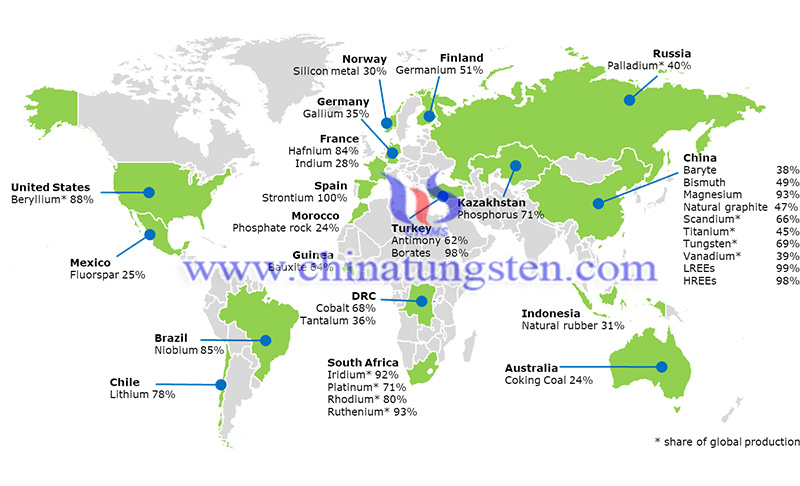EU Announces Actions to Ensure Rare Earth Mineral Resources
- Details
- Category: Tungsten's News
- Published on Friday, 11 September 2020 21:42
To make Europe's rare earth materials supply more secure and sustainable, European Commission (EU) has launched new tragedies. The EU Internal Market Commissioner, Thierry Breton stated at a press conference that Europe holds various resources, such as, aluminum, cobalt, and lithium, while they are far from being exploited.
As the COVID-19 outbreak, the European Union is worried that it will increasingly rely on raw materials supplied by other countries in the production of smartphones and other products. Therefore, it recently proposed a new strategy to ensure the source of rare earth minerals.
On September 3, the European Union proposed a new strategy to ensure the source of rare earth minerals, which will reduce its dependence on China, Chile, South Africa, and other countries by establishing the European Raw Materials Alliance.

The COVID-19 epidemic highlights the global dependence on electronic products for remote working. The European Union has also joined the competition with the United States, China, Japan, and other countries to ensure the source of raw materials required in the fields of communications, health, defense, and aerospace.
Gaps in EU capacity for extraction, processing, recycling, refining and separation capacities (e.g. for lithium or rare earths) reflect a lack of resilience and a high dependency on supply from other parts of the world. Certain materials mined in Europe (like lithium) currently have to leave Europe for processing. The technologies, capabilities and skills in refining and metallurgy are a crucial link in the value chain.
The European Commission realizes that it is necessary to reduce risks in the supply of key raw materials for green and digital transformation. These crucial raw materials increased from 27 in 2017 to 30 in 2020. Because of its insufficient, or concentrated in the hands of a few suppliers, UN regards it as critical materials.
Vice President of the European Commission Maros Sefcovic pointed out that Europe was currently highly dependent on a limited number of non-EU countries for its raw material. For example, China provides 98 % of the supply of REEs, Turkey provides 98% of the supply of borate, and South Africa provides 71% of the needs for platinum and an even higher share of the platinum group metals iridium, rhodium, and ruthenium. The EU relies on single companies for its supply of hafnium and strontium.
Sefcovic pointed out that the European Commission must completely change its practices. This is because it relies heavily on countries with lower environmental and social standards, less freedom, poverty, and non-sustainable economic methods, to provide limited raw materials.
Our strategic foresight tells us that the demand for raw materials is only going to rise. For example, Europe will need almost 60 times more lithium and 15 times more cobalt by 2050 for electric cars and energy storage alone. Demand for REEs used in permanent magnets, critical for products like wind generators, could increase ten-fold in the same period.
The EU also intends to study various innovative methods to reuse, repair and recycle products containing rare earth minerals. The goal is to confirm the possible supply of key raw materials in domestic storage and waste by 2022, and find out what is conducive to recycling these raw materials.
- Rare Earth Manufacturer & Supplier, Chinatungsten Online: www.chinatungsten.com
- Tungsten News & Prices of China Tungsten Industry Association: www.ctia.com.cn
- Molybdenum News & Price: news.molybdenum.com.cn
- Tel.: 86 592 5129696; Fax: 86 592 5129797; Email: sales@chinatungsten.com



 sales@chinatungsten.com
sales@chinatungsten.com